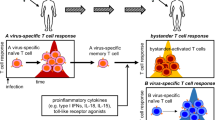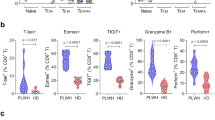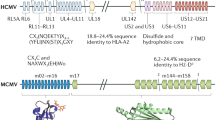Abstract
THE control of herpes simplex virus (HSV) infection by immunological mechanisms seems to be complex and is poorly understood. Neutralising antibodies to HSV plus complement seem to have no effect on the propagation of HSV infection, because HSV spreads to adjacent cells by passing through intercellular bridges1–3. Anti-HSV antibodies plus complement, however, destroy virus-infected cells, but cannot prevent the spread of HSV, suggesting that the virus must be transferred to neighbouring cells before immune lysis occurs1,5. Therefore if lymphocyte-mediated cytolytic mechanisms are instrumental in blocking the spread of HSV in vivo, they ought to destroy infected cells at a very early stage in the viral maturation cycle, before infectious viral particles are produced. Indeed, effective antibody dependent cell-mediated cytotoxicity (ADCC) has been demonstrated in vitro using target cells infected with HSV4,5. In this system K-cell-mediated destruction of virus-infected cells takes place very early in the infectious cycle5. As in vivo protection against HSV infection is predominantly T-cell-dependent6,7, the in vivo spread of HSV infections may be controlled by virus-specific cytotoxic T lymphocytes (CTL). But no virus-specific CTL so far have been detected in the spleen of HSV-infected mice. Using a different experimental approach we have now shown that T lymphocytes of mice undergoing a local HSV infection, when transferred in vitro, differentiate into effective CTL. The CTL generated are highly cytotoxic for HSV-infected target cells.
This is a preview of subscription content, access via your institution
Access options
Subscribe to this journal
Receive 51 print issues and online access
$199.00 per year
only $3.90 per issue
Buy this article
- Purchase on Springer Link
- Instant access to full article PDF
Prices may be subject to local taxes which are calculated during checkout
Similar content being viewed by others
References
Lodmell, D. L., Niwa, A., Hayasen, K. & Notkins, A. L. J. exp. Med. 137, 706–720 (1973).
Black, F. L. & Melnik, J. L. J. Immun. 74, 236–241 (1955).
Christian, R. T. & Ludovici, P. P. Proc. Soc. exp. Biol. Med. 138, 1109–1112 ( 1971).
Rager-Zisman, B. & Bloom, B. Nature 251, 542–543 (1974).
Shore, S. L., Cromeans, T. L. & Romano, T. J. Nature 262, 695–696 (1976).
Rager-Zisman, B. & Allison, A. C. J. Immun. 116, 35–40 (1976).
Mori, R., Tasaki, T., Kimura, G. & Takeya, K. Arch. ges. Virusforsch. 21, 459–462 (1967).
Just, I., Dundaroff, S. & Falke, D. J. gen. Virol. 29, 69–80 (1975).
Pfizenmaier, K., Trostmann, H., Röllinghoff, M. & Wagner, H. Z. ImmunForsch. 15, 224–236 (1976).
Wagner, H. & Röllinghoff, M. Eur. J. Immun. 4, 745–750 (1974).
Author information
Authors and Affiliations
Rights and permissions
About this article
Cite this article
PFIZENMAIER, K., STARZINSKI-POWITZ, A., RöLLINGHOFF, M. et al. T-cell-mediated cytotoxicity against herpes simplex virus-infected target cells. Nature 265, 630–632 (1977). https://doi.org/10.1038/265630a0
Received:
Accepted:
Issue Date:
DOI: https://doi.org/10.1038/265630a0
This article is cited by
-
Resistance to ectromelia virus infection in mice Analysis ofH-2-linked gene effects
Archives of Virology (1991)
Comments
By submitting a comment you agree to abide by our Terms and Community Guidelines. If you find something abusive or that does not comply with our terms or guidelines please flag it as inappropriate.



